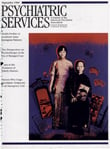A ten-year review of the effect of OBRA-87 on psychotropic prescribing practices in an academic nursing home
Abstract
OBJECTIVE: The Omnibus Budget Reconciliation Act of 1987 (OBRA-87) included provisions for regulating the use of psychotropic medication, particularly antipsychotics, in long-term-care facilities. The study examined the effect of OBRA-87 on patterns of prescribing of psychotropic medication in a 514-bed nursing home affiliated with a large medical school. METHODS: Computerized pharmacy records for the ten-year period from March 1984 through July 1994 were retrospectively reviewed to identify orders written for psychotropic medications and to determine the percentage of nursing home residents who received prescriptions for those agents and the average daily dose of the most frequently prescribed agents. RESULTS: During the period before implementation of the regulations, the percentages of residents who received antidepressants, anxiolytic and sedative-hypnotic medications, and antipsychotic medications were stable. After implementation, prescription of antidepressants increased significantly, coinciding with a reduction in prescription of anxiolytics and sedative-hypnotics and a substantial decrease in prescription of antipsychotics. The total number of residents who received any type of psychotropic medication decreased, and over time a trend toward prescription of agents recommended for geriatric use, such as short-acting benzodiazepines and tertiary tricyclic antidepressants, emerged. CONCLUSIONS: The changes that resulted from the OBRA-87 regulations reffect both the restrictions placed on classes of medication and the prevalence of psychiatric disorders in the nursing home. In this facility, OBRA-87 appears to have served as an impetus for clinical review and change in practice style.
Access content
To read the fulltext, please use one of the options below to sign in or purchase access.- Personal login
- Institutional Login
- Sign in via OpenAthens
- Register for access
-
Please login/register if you wish to pair your device and check access availability.
Not a subscriber?
PsychiatryOnline subscription options offer access to the DSM-5 library, books, journals, CME, and patient resources. This all-in-one virtual library provides psychiatrists and mental health professionals with key resources for diagnosis, treatment, research, and professional development.
Need more help? PsychiatryOnline Customer Service may be reached by emailing [email protected] or by calling 800-368-5777 (in the U.S.) or 703-907-7322 (outside the U.S.).



